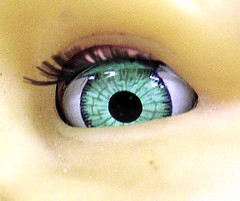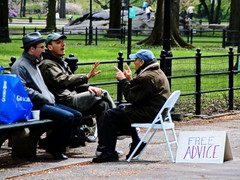 [Photo: baby doll eye by zen]
[Photo: baby doll eye by zen]One morning last week while getting ready for work, I was watching CNN's American Morning. Soledad O'Brien conducted an interview with teen, Kiri Davis, and her mentor, Shola Lynch. Davis had been a participant in the
Reel Works Teen Filmmaking program and had made a film regarding the standards of beauty imposed on today's black girls, and how these standards affect the girls' self-image. As part of her film, Davis decided to re-create the "
doll test" which had been originally conducted in the 1940's by Dr. Kenneth Clark in the desegration case, Brown vs. Board of Education. In the original doll test, Dr. Clark showed 4 dolls, alike except for color, to black children between the ages of 3 and 7 and asked them questions to determine their racial preference and perception.
During the CNN interview, a snippet of Davis' recreation of the test was played. What I saw broke my heart. Davis' entire film, titled "A Girl Like Me," can be found at the
Media that Matters Festival site. The film is 7 minutes long and I highly suggest that you watch the entire feature. It was very sad and disheartening to hear the girls in the film express the pressures they experience to look more white -- including altering their hair and even attempting to alter their skin color -- from society, their peers and, in some cases, even their parents!
If you watch the film, I suggest paying particular attention to the segment showing portions of Davis' recreation of the doll test. In her version, 21 black children were presented 2 dolls, one black, one white, alike except for color. 15 children preferred the white doll over the black doll. When asked which doll was "bad" many children chose the black doll, explaining their choice with an explanation as simple as, "because it's black." It was unbelievable to me that such damaging messages of worthlessness were perceptible to these children at such an early age!
The horridness of the preconcieved notions the children experience was hammered home for me by the shame reflected on the face of the last girl shown in the doll test portion of the movie. The sequence of events leading up to this shot was accurately described in an article on the
New York Daily News website:
The camera zooms in on a sweet-faced Harlem girl, about 5 years old with her tightly braided hair pulled back, as she's asked to identify "the doll that looks bad." She examines the white doll and black doll in front of her - identical except for their color - and tentatively chooses the black doll. It's bad, she says, "because this is black."
The "nice" doll is nice "because she's white," the black girl says.
And which doll, she is asked, is the doll that looks like you?
The camera then settles on her young, serious face as she slowly slides the black doll forward.
You must watch the film to truly understand the powerfulness (or should I say powerlessness) of the expression on this girl's face. The look of shame and disappointment that comes across her face when she realizes that she identifies with the "bad" doll on a physical level is heart wrenching. Did the look on her face haunt you as much as it did me?
This film presents a clear reflection of the reults of messages of societal racial preference. But this is just one notion that is drilled into our children on a daily basis. Our children--of all colors and creeds--are exposed to so many prejudices and standards on a daily basis which force them to identify with a specific group -- in both positive and negative ways. These messages create a fear of uniqueness, a fear of standing out in the crowd. Are we squelching the minds of our children by bombarding them with so many preconceived notions? Are creating cookie-cutter children afraid to experiment outside of the box created for them?
I could go on and on about this topic, but I fear I have gone on too long already. Instead, I'd like to know what your thoughts are.
What went through your mind when watching Davis' film? What pressures have you experienced to conform to a specific societal standard?
What will it take for us as a society to accept and celebrate our differences? Why continue to perpetuate such dysfunctional attitudes from generation to generation? Why isn't there a larger uprising to fight the unrealistic and fantastical images that are ingrained in our children's minds?
Technorati tags: doll test, Kenneth Clark, Media that Matters Festival, Reel Works Teen Filmmaking, Kiri Davis, Shola Lynch, A Girl Like Me
 [Photo: wish i could see you... by jaanikas]
[Photo: wish i could see you... by jaanikas]


















